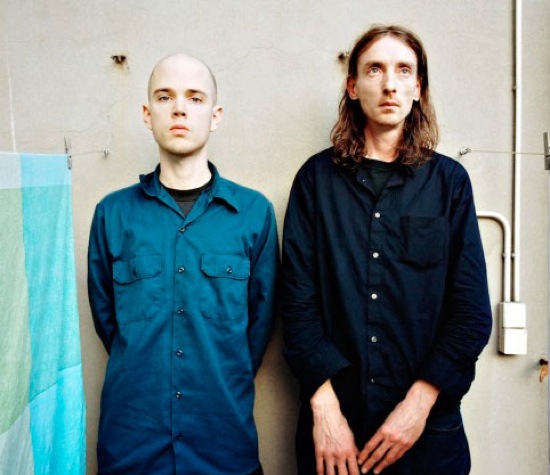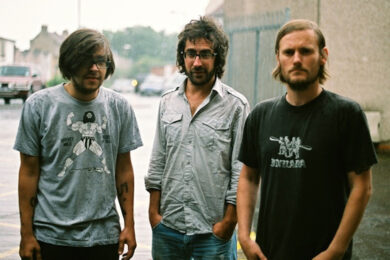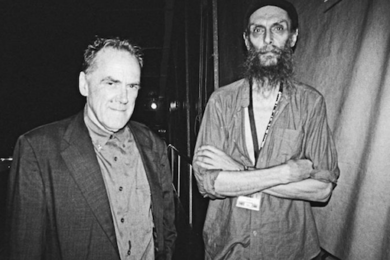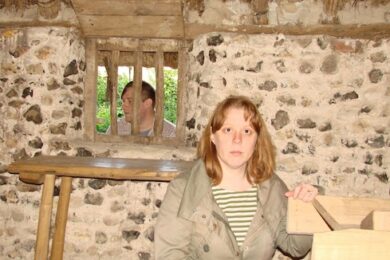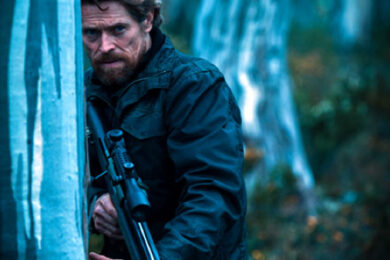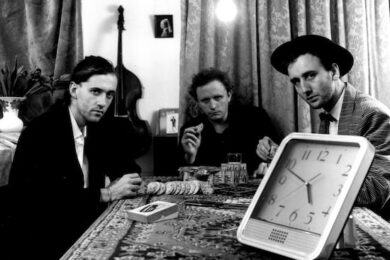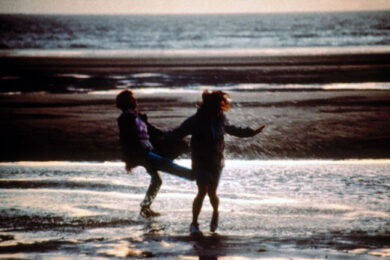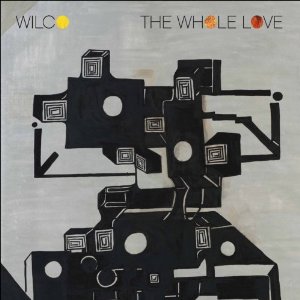Having been involved in countless avant-garde projects over the years, including work with Six Organs Of Admittance, Thurston Moore and Nels Cline, as well as touring with Björk, Chris Corsano is back at Supersonic following his 2010 spot at the festival with Heather Leigh Murray.
We caught up with him ahead of his slot tonight – 7.30pm on the Warehouse stage – as part of the Flower/Corsano Duo, with Vibracathedral Orchestra’s Michael Flower on guitar.
I’m going to start off with something pretty meta, so hopefully you’ll forgive me. I read an interview with Tim Hecker where he said that interviews were a useful tool for instrumental/vocal-less musicians to give some context to what they’re doing and I’ve seen you mention the power of song and album titles in a similar way. Has using words to describe, contextualize or simply discuss your music become any easier for you over the years?
Chris Corsano: I can’t say that it’s gotten any easier. As soon as I’ve said something in an interview I immediately I feel like it’s inaccurate, incomplete or just plain dumb. I guess that doesn’t bode well for the rest of this interview, does it? I can never seem to get around the fact that as soon as you make the effort to observe and describe what you’re doing, you fix it in single state, when what goes into making music is really not that linear or one-dimensional.
On a side note to that, it seems like you, Ben and Rick share a similar sense of humour when it comes to talking about your music, perhaps that points out the absurdity of the whole enterprise…
CC: Yeah, we do share that. I can’t speak for Ben and Rick, but for me a little irreverence in interviews and song titles is healthy. I take music as seriously as anybody, but I feel that lofty song titles or whatever sometimes get mistook as a shortcut for real earnestness and depth. There’s already plenty of heavier/more cosmic/more dour/etc.-than-thou language in titles, liner notes and interviews, so my contrarian nature can’t help but push against that a little. It’s not that "heavy" or "serious" isn’t done well by lots of people. Personally, I just don’t want to write a check with my mouth that my music can’t cash, you know? If I wanted to be cynical about my own intentions (oh, and why not?), I could also say that it’s partially a cop-out on my end, too… A little escape hatch for the guilt/embarrassment/vulnerability of releasing, yet another, record and in effect saying to the world "HEY, LOOK AT WHAT I DID! AIN’T I SPECIAL? (And is anybody listening)?". Obviously, at least part of me thinks I’m worthy of releasing records – otherwise, why bother? – but there’s a whole lot of self-doubt in there too…especially for the solo stuff. Probably most accurately, my sense of humor is just part of who I am, so it might as well play some part in what I do. I don’t feel like it needs or wants a place in the actual music, but everything else is fair game.
You’ve talked in the past about how it was seeing/hearing free music live that really sparked your interest in it originally and it seems like live performance is still totally central to what you do. So has it been a challenge for you to reconcile that with studio work at all? Do you take a different approach to work in the studio compared to home or live recording?
CC: Yes, it’s tough to cram the energy of a live show onto a piece of plastic. I think there are things you can do to bridge the gap a little, and I’ve been trying to learn about ways of recording to help do just that. Also, I think you have to accept that they’re two separate things, each with its own set of possibilities and limitations – what makes for a good live gig does not necessarily make the best record, and vice-versa. And as far as different types of recording situations: studios tend to be sterile environments to work in compared to home or live recording, though I don’t necessarily need to attach such a pejorative connotation to it – I could’ve also said that it’s the most "pristine." The general approach, no matter where I’m at, is to try to say something that deals with both internal (how I feel, what I want to play) and the external (the audience, the room’s acoustics, whatever medium the music might end up on). In effect, I want to reconcile the two with hopefully as little sacrifice as possible on either end.
Linked to the above in a way is the sense of community that comes from having similar line-ups at load of gigs and festivals, which you’ve mentioned being very prevalent during the last decade. How do you think the sense of community you feel a part of has developed in recent years and has it been influenced at all by the internet and how easy it is to keep in touch with people and abreast of new releases and things like that?
CC: It’s changed a bit, but it’s hard to say how much of that change is the "scene" itself and how much is me. I’ve moved around a lot, both in terms of living in a bunch of different places in the last 10 years and also touring often. And I guess you could say I run in a few different circles (though there are links between all of them). I don’t know, maybe that makes me a little bit of an outsider wherever I am, but I’d say weird music communities (be they called noise, free improv, free folk, whatever) are made up of a welcoming bunch of people, most of whom also operate in what some people think of as multiple genres.
I think the internet has had an influence on the lay of the land for a long while (Hanson list & other message boards, for example) – pretty much since near the beginning of when I felt part of something beyond what I knew locally in western Massachusetts. That influence over the sense of community has accelerated and changed over time (e.g. blogs, first of music writing and now of straight downloads of records; Facebook, etc.). But in my eyes, the internet’s always been a pretty weak substitute for being there.
Following that again, you’ve talked about being something of a record collector, which is often emblematic of a sense of community. Is that still something you pursue and, if so, what do you feel is special about the physical embodiment of music? How do you feel about people who listen to your music on YouTube or download it (legally or illegally)? Does that bother you at all?
CC: I took a long break from buying records when I lived in the UK, but now that I’m back living in the States and touring there more often, old habits have returned. I don’t know how much that makes me part of a community; personal ownership of a physical object seems less communal than the shared experience of a live show with other people in the audience, for instance. But I like them all the same. Regarding YouTube, that’s what I mean by the internet being a weak substitute for being there – some shaky cameraphone video with terrible sound is a pretty half-assed representation, if you ask me. I started making my own videos because I got tired of complaining about the quality of most of the live footage on YouTube. The reason I play live and release records is to put something of myself out in the world and see if it resonates with anybody. Having the main way that people come to what you do be through bad live YouTube videos feels weird – it adds a pretty big step of mediation and abstraction after the ones already inherent in the live performance and recording processes. But, the last time I looked at a calendar it was 2012, and my time-travelling DeLorean has a flat, so these are the conditions in which I work until I can dream up a better model.
Finally on that train of thought, I talked to John Weise before about how noise music in the late 90s kind of reached a saturation point, that there was now so much of it (and so much of it was good) that people could realistically live totally within that scene and not be influenced by anything happening outside of it. This was seen as maybe having a detrimental effect on the music. Do you have to make a conscious effort to keep the range of what you’re exposed to quite broad? Do you ever feel the walls closing in a bit around you?
CC: I don’t think of it as an effort, it’s just what comes naturally. Who isn’t interested in more types of music than what they play? And maybe this is my record nerd tendencies talking, but having your mind blown by something like you’ve never heard before is one of the good things about being alive. The walls aren’t closing in, they’re just daring you go through them head first.
I’m always interested in the way a person’s environment influences them and I was wondering if living in England and Scotland had any particular effect on your playing or thinking? How does it compare to living as a musician (or hell, just living) in America?
CC: I’d say my biggest influence by far will always be who I’m playing with. So living in the UK affected me mainly by creating all these chances to play with folks on that side of the Atlantic. I don’t think there was anything in the culture, architecture, landscape, tap water or whatever that had anywhere near as direct an effect. I’ll say this, though: moving to Manchester in 2005 did provide a huge kick in the ass to do solo stuff since I went from having loads of people to collaborate with in western Massachusetts to not knowing anybody except for Mick over in Leeds. When we first moved there, we were living in an apartment building, so most of the sounds I came up with in that period were on the quieter side to keep peace with the neighbors.
You’ve been playing with Mick Flower for quite a while now so do you get a different kind of feeling now when you perform together? Obviously living in different parts of the world must have an impact but even just as you’ve become ever more familiar with what makes the other tick, the way you relate (generally and moment-to-moment during a set) might have changed. You’ve talked about it feeling like one long song with each performance adding to it, is that still the case?
CC: I’d say that description of one long song still holds true, though we’ve also done things like The Count Visits record with Matt Heyner and some of the tracks on The Four Aims which have been a departure from what we usually do. But I’d hope that any song that long (or band or relationship) would have some flexibility and not be the same old-same old from here to eternity. Mick and I have never lived in the same town, so it’s always been important to the duo that there’s a chemistry from the word go. And I think that if it is there, then it’s a thing you can plug back into each time you meet up, regardless of the miles and months in between gigs. You have to, otherwise it won’t work. There’s a certain "you either got it or you don’t" quality when it comes to the dynamics of an improvising group that’s there (or not) from the start. In this case, the "it" I’m talking about isn’t being an objectively good band according to anybody else’s ears. And I’m not so foolish as to say that bands and their individual members don’t develop and change over time. But the ability (or at least the promise of that ability) to make music as a group that you yourselves fully believe in is usually present or not the first time you play together. The recognition of a potential that’s there from the onset—maybe it’s realized more or less from one show to the next, but it’s there nonetheless—is why you continue playing together and pushing each other.
I was reading about your residency at Incubate festival a few years back and how you unexpectedly ended up playing with both Dennis Tyfus and Christine Sehnaoui on one night. It was interesting that you felt this was different because they were two people who might not have ever played together otherwise. Any chance of something similar happening at Supersonic this year? Have there been any more of those types of unexpected collaborations recently, formal or otherwise?
CC: There weren’t too many collaborations where I was introducing people to each other I’d already played with as in the case of Dennis & Christine, but I have been lucky enough this year to get to work with a bunch of new people. As much as I try not too, I can’t help but get at least a little idea in my head beforehand of how it’s going to go, and I’m almost always wrong in some sense. Maybe I’m just bad at predicting the outcome, but I like to be surprised at the things a new group can yield. If I might quote one of England’s preeminent 20th century philosophers and drinkers, "they say music should be fun / Like reading a story of love / But I wanna read a horror story". EXACTLY. I’d rather be the musical equivalent of H.P. Lovecraft than Bridget Jones’ Diary. As for Supersonic, I’m don’t want to jinx it, but there’s something in the works for a guest spot on a song.
Have you happened upon any new bits of junk lately that you’ve found interesting? Any new techniques or combinations of things that you’ve found inspiring or challenging?
CC: I’ve been going back to old techniques (stringed-drum stuff, especially) and seeing if I can push some things a little further in terms of their range of expression.
Do you think you’re any closer to having your music streamed on NPR these days?
CC: Ha! Anything’s possible, but I don’t think I’m any closer (or I guess any further, either) from being on NPR.

